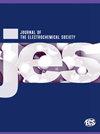Fast Charging of Lithium-Ion Batteries While Accounting for Degradation and Cell-to-Cell Variability
IF 3.3
4区 工程技术
Q2 ELECTROCHEMISTRY
引用次数: 0
Abstract
Safety and maintaining high performance are key considerations during the operation of lithium-ion batteries. Battery degradation, in particular lithium plating and loss of active material, is often accelerated by fast charging. This study explores a strategy for the design of fast charging protocols that takes into account the influence of the variability between battery cells on factors that can impact degradation. We employ a non-intrusive polynomial chaos expansion to identify the key parameters for each degradation condition. We explore the reduction of battery degradation by adjusting constraints such as the maximum C-rate and voltage. Tight control of the key adjustable parameters contributes significantly to reducing the confidence interval of the degradation factors, allowing reduced charging time with minimal degradation. The application of our approach to two state-dependent fast charging protocols for a LiC6/LiCoO2 battery indicates the value in explicitly accounting for uncertainties when designing charging protocols that minimize degradation. Highlights A novel optimal charging strategy is proposed for reducing battery degradation The strategy explicitly takes probabilistic uncertainties into account The uncertainties are addressed by using a polynomial chaos expansion The strategy is used to design fast charging protocols for lithium-ion batteries The key parameters contributing to battery degradation are identified快速为锂离子电池充电,同时考虑电池降解和电池之间的变异性
安全和保持高性能是锂离子电池运行过程中的主要考虑因素。快速充电通常会加速电池降解,特别是锂镀层和活性材料的损失。本研究探讨了快速充电协议的设计策略,该策略考虑到了电池单元之间的变化对可能影响降解的因素的影响。我们采用非侵入式多项式混沌扩展来确定每种退化条件的关键参数。我们探索了通过调整最大 C 率和电压等约束条件来减少电池退化的方法。对关键可调参数的严格控制大大有助于缩小退化因子的置信区间,从而在减少退化的同时缩短充电时间。将我们的方法应用于锂C6/钴酸锂电池的两个与状态有关的快速充电协议表明,在设计可最大限度减少劣化的充电协议时,明确考虑不确定性是很有价值的。该策略明确考虑了概率不确定性,通过使用多项式混沌扩展来解决不确定性问题。
本文章由计算机程序翻译,如有差异,请以英文原文为准。
求助全文
约1分钟内获得全文
求助全文
来源期刊
CiteScore
7.20
自引率
12.80%
发文量
1369
审稿时长
1.5 months
期刊介绍:
The Journal of The Electrochemical Society (JES) is the leader in the field of solid-state and electrochemical science and technology. This peer-reviewed journal publishes an average of 450 pages of 70 articles each month. Articles are posted online, with a monthly paper edition following electronic publication. The ECS membership benefits package includes access to the electronic edition of this journal.

 求助内容:
求助内容: 应助结果提醒方式:
应助结果提醒方式:


